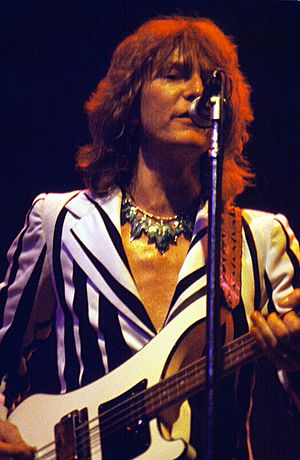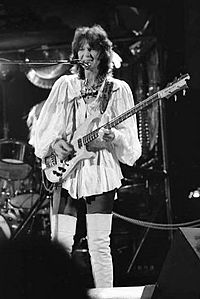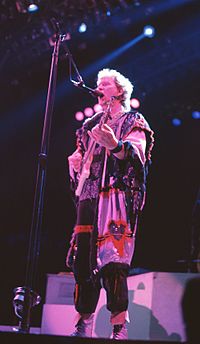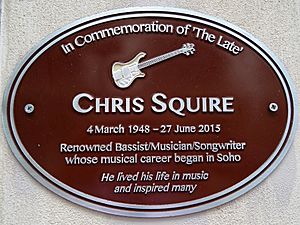Chris Squire facts for kids
Quick facts for kids
Chris Squire
|
|
|---|---|

Squire in August 1977
|
|
| Background information | |
| Birth name | Christopher Russell Edward Squire |
| Born | 4 March 1948 Kingsbury, London, England |
| Died | 27 June 2015 (aged 67) Phoenix, Arizona, U.S. |
| Genres | |
| Occupation(s) | Bassist |
| Years active | 1965–2015 |
| Labels |
|
Christopher Russell Edward Squire (born March 4, 1948 – died June 27, 2015) was an English musician. He was famous as the bass player and singer for the progressive rock band Yes. Chris Squire was a founding member of Yes. He stayed with the band until he passed away. He played on every studio album from 1969 to 2014. In 2017, he was added to the Rock and Roll Hall of Fame as part of Yes.
Many people saw Squire as the most important bass player in English progressive rock. He influenced many other bassists. His special sound and melodic bass lines were well-known. He was known for playing his Rickenbacker 4001 bass. From 1991 to 2000, Rickenbacker even made a special bass named after him.
Contents
Chris Squire's Early Life
Chris Squire was born on March 4, 1948, in Kingsbury, London. He grew up there and in nearby areas like Queensbury and Wembley. His father was a taxi driver, and his mother was a secretary. As a young boy, Chris enjoyed listening to records by Lena Horne and Ella Fitzgerald. But he was most interested in church music.
Singing in the Choir
At age six, Chris joined the church choir at St Andrew's in Kingsbury. His friend, Andrew Pryce Jackman, was also in the choir. They even got to sing at St. Paul's Cathedral. Their choirmaster, Barry Rose, taught Chris a lot. Chris learned that "working at it was the way to become best at something." He also sang in the choir at his next school.
Starting His Music Journey
Chris did not think about a music career until he was sixteen. When The Beatles became popular in the early 1960s, he wanted to be in a band. A school friend suggested he play the bass guitar. His friend thought Chris's tall height and large hands were perfect for it. Chris then bought his first bass, a Futurama. He said it was "very cheap, but good enough to learn on."
In 1964, Chris and a friend were suspended from school for having long hair. They were given money to get haircuts. Instead, they went home and never returned to school. Chris's mother helped him find a job selling guitars at a shop called Boosey & Hawkes. There, he used his staff discount to buy a new bass, a Rickenbacker 4001, in 1965.
Chris Squire's Music Career
Early Bands and Performances
Chris Squire's first band was called the Selfs. It was a rock and rhythm and blues band. Andrew Jackman played keyboards, and Martin Adelman played drums. Their first show was at a youth club. In 1965, Chris, Andrew, and Martin formed a new group called the Syn. They played Tamla Motown songs. Later, they started playing psychedelic rock.
The Syn became popular and played weekly at the Marquee Club in Soho. They even got a record deal. The band once opened for The Jimi Hendrix Experience. Chris said, "I saw what was possible, and I just had this innate faith that I was going to make it." The Syn released two singles before breaking up.
Forming the Band Yes
In September 1967, Chris joined a psychedelic group called Mabel Greer's Toyshop. This band included Peter Banks, Clive Bayley, and Bob Hagger. They played at the Marquee club. One evening, Chris met Jon Anderson, who worked at a nearby club. Jon was a singer who had not found success yet. Chris and Jon discovered they both liked Simon & Garfunkel and vocal harmonies. They soon wrote a song together called "Sweetness." This song later appeared on the first Yes album.
As the band grew, Jon and Chris brought in drummer Bill Bruford, keyboardist Tony Kaye, and Peter Banks. They decided to change the band's name from Mabel Greer's Toyshop. They chose the name Yes, which was Peter Banks's idea. Yes played their first show on August 4, 1968. Chris explained why they started Yes: "I couldn't get session work because most musicians hated my style. We started Yes as a vehicle to develop everyone's individual styles."
In August 1969, Yes released their first album, also called Yes. Chris Squire helped write four of the album's eight songs.
When Bill Bruford left the band in 1972, Alan White became the new drummer. Chris changed his playing style to fit Alan's drumming. He felt he could play "a bit less than before and still get my playing across."
Chris Squire was the only member to play on all 21 of Yes's studio albums. These albums were released from 1969 to 2014. He was a main force behind the band's music. Heaven & Earth was his last studio album with Yes.
While Jon Anderson wrote most of the lyrics, Chris often wrote the music with guitarist Steve Howe. Chris and Steve also sang backing vocals with Jon.
Chris was known for often being late. Because of this, he would sometimes drive very fast to get to shows on time. Once, he even caused an accident after falling asleep while driving. Luckily, no one was hurt. A special plaque honoring him was even called " 'The Late' Chris Squire " because of his habit.
Chris Squire, along with Alan White and Steve Howe, owned the "Yes" name. This meant that when some members formed a different group in 1989, they could not use the name Yes.
After Chris Squire passed away on June 27, 2015, Yes played their first concert without him on August 7, 2015. Former member Billy Sherwood took Chris's place for their tours.
Other Music Projects
Chris Squire mostly focused on Yes's music. He did not release much solo work. His first solo album was Fish Out of Water in 1975. It featured Yes members Bill Bruford and Patrick Moraz.
In 1981, Chris was part of a short-lived band called XYZ. The name stood for eX-Yes/Zeppelin. This band included Chris, Alan White, and guitarist Jimmy Page from Led Zeppelin. They recorded some demo songs but never released a full album.
Later, Chris joined Yes guitarist Billy Sherwood in a side project called Conspiracy. Their first album in 2000 had ideas for songs that appeared on Yes albums. Conspiracy's second album, The Unknown, came out in 2003.
In 2004, Chris joined a reunion of his old band, The Syn. They released an album called Syndestructible in 2005.
Chris also worked on two solo projects with other musicians. He released a Christmas album, Chris Squire's Swiss Choir, in 2007. He also worked with Steve Hackett from the band Genesis. They released the album A Life Within a Day in 2012 under the name Squackett.
Chris Squire's Music Style and Influence
Chris Squire's bass sound was very clear and special. His playing was powerful, energetic, and melodic.
He mainly played with a plectrum (a guitar pick). He held the pick very close to his fingertips. This meant his thumb would also hit the strings, creating subtle harmonics. He often used techniques like hammer-ons and pull-offs. Besides distortion, he sometimes used other effects like chorus, flanger, and wah-wah pedals. These effects were usually used by guitarists.
In 1973, Chris explained how he got his unique sound. He rewired his Rickenbacker bass to be in stereo. He sent the bass and treble sounds to separate amplifiers. By splitting the signal, he sent low sounds to a bass amplifier and high sounds to a guitar amplifier. This created a "sandwich" sound. It added a rough, overdriven edge to his sound while keeping a strong bass. This made his bass sound bright and growling in higher notes, and clean and solid in lower notes.
This method allowed Chris to use distortion on his bass. It avoided the flat, fuzzy sound that often happens when bass guitars are overdriven. Chris also used fret buzz, which is usually seen as a problem. But he used it to add a rough edge to his playing.
He also used fresh Rotosound Swing Bass strings for every show. Chris Squire's complex bass playing has influenced many bassists. These include Geddy Lee of Rush, Steve Harris of Iron Maiden, and John Myung of Dream Theater. John Deacon of Queen also said Chris Squire was his favorite bass player.
Instruments and Gear
Chris Squire's main instrument was a 1964 Rickenbacker bass. He bought it in 1965. It was a British export version of the 4001 model. Chris said he got this bass while working at a music store in London. This bass had been customized several times, which changed its sound. A faulty pickup also added to its unique tone. This instrument's warm, guitar-like sound allowed the bass to play a more "lead" role in the music.
While he was mostly known for his Rickenbacker, Chris played many different bass guitars. He chose each instrument for different songs or times. He was one of the first to use an eight-string bass. He also sometimes played a fretless bass.
In the early years of Yes, Chris often played a Fender Telecaster bass. In the mid-1970s, he used a Fender Jazz bass for some songs. He also played a Gibson Thunderbird. Later in his life, he used basses from Lakland and Yamaha.
Chris started playing eight-string bass in the early 1970s. He used a special custom instrument for this. He also had a unique triple-neck bass guitar made by Wal. This bass was a gift from his bandmate Rick Wakeman. Chris used it for live performances of the Yes song "Awaken." It had a six-string bass, a standard four-string bass, and a fretless four-string bass. This allowed him to play different parts of the song without changing instruments.
Chris also used bass pedals. He started with Moog Taurus pedals. Later, he used samples triggered from a sampler. His effects pedals included fuzz, chorus, flanger, octave, and wah-wah pedals. He used Marshall amplifiers and cabinets. Over time, he also used Sunn and Ampeg amps.
Besides bass guitar, Chris sometimes played harmonica, piano, and six or twelve-string guitar.
Chris Squire's Personal Life
Chris Squire was married three times and had five children.
He met his first wife, Nikki, in 1970. They married in 1972. Nikki sang on some of Chris's songs. They had three daughters: Carmen, Chandrika, and Camille. They divorced after fifteen years.
Chris married actress Melissa Morgan in 1993. They had a son named Cameron in 2000. They divorced in 2008.
His third wife was Scotland Squire. They had a daughter named Xilan in 2008. They lived in Phoenix, Arizona.
Chris was a vegetarian in the 1970s. He also once had a heart attack.
Why Was He Called "Fish"?
Chris Squire's nickname was "Fish." This was for a few reasons. His astrological sign was Pisces, which is a fish sign. He also loved taking baths. His bandmate Bill Bruford often talked about how Chris spent a long time in the bathroom. Once, Chris even accidentally flooded a hotel room while showering! Another reason for the nickname is that "bass" can mean a low sound or a type of fish. The nickname appears in his solo album, Fish Out of Water, and a Yes song called "The Fish (Schindleria Praematurus)."
In 2011, a type of fossil fish was named Tarkus squirei in his honor. This also referenced his nickname.
Illness, Death, and Tributes
On May 19, 2015, Yes announced that Chris Squire had been diagnosed with a type of leukemia. He took a break from performing to get treatment.
Chris Squire passed away on June 27, 2015, at age 67. He died from the illness in Phoenix, Arizona. Yes's official Facebook page shared the sad news the next day. Many musicians, like Brian May, Geezer Butler, and Gene Simmons, paid tribute to him. His bandmates also shared their sadness.
In April 2016, an asteroid was officially named after Chris Squire. Asteroid (90125) Chrissquire was discovered in 2002.
Discography
Solo Singles
- "Run with the Fox" – with Alan White (1981)
Solo Albums
- Fish Out of Water (1975)
- Chris Squire's Swiss Choir (2007)
With Conspiracy
- Conspiracy (2000 + DVD)
- The Unknown (2003)
With Squackett
- A Life Within a Day (2012)
With The Syn
- see The Syn
With Yes
- see Yes discography
As Guest Musician
- 1973: Rick Wakeman - The Six Wives of Henry VIII
- 1977: Rick Wakeman - Rick Wakeman's Criminal Record
- 1987: Esquire - Esquire (with Chris's ex-wife Nikki Squire and daughter Carmen)
- 1990: Rock Aid Armenia - "Smoke on the Water" (a charity single)
- 2002: Gov't Mule - The Deep End, Volume 2
- 2009: Steve Hackett - Out of the Tunnel's Mouth
- 2011: Steve Hackett - Beyond the Shrouded Horizon
- 2015: Steve Hackett - Wolflight
Images for kids
See also
 In Spanish: Chris Squire para niños
In Spanish: Chris Squire para niños
 | Shirley Ann Jackson |
 | Garett Morgan |
 | J. Ernest Wilkins Jr. |
 | Elijah McCoy |








